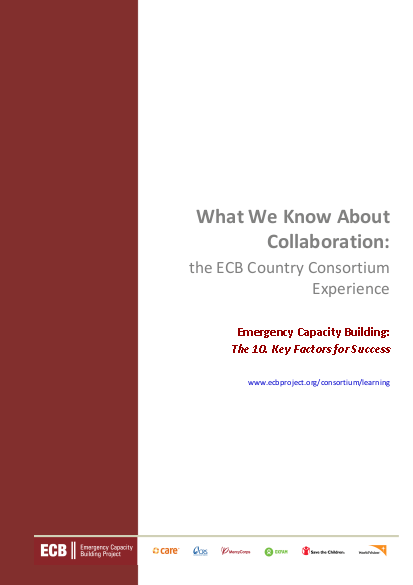
The Emergency Capacity Building (ECB) Project is a global humanitarian initiative led by six international agencies working through ECB country-level consortia in Bangladesh, Bolivia, Indonesia, Niger, and the Horn of Africa.1 Since 2005, the ECB Project community has been working to improve the speed, quality and effectiveness of emergency preparedness and response in the humanitarian community by building capacity at the field, organizational and global humanitarian sector levels. The key principles of collaboration, partnership and non-duplication provide a framework for participating agencies to work together towards improved response. The ECB Project has a rich history of collaboration and learning both at the global and field levels. Project communities of practice are developing many practical tools, reports, and case studies. This joint work is based on three inter-related themes that agency members identified as common challenges amongst all partners. These themes are: Accountability and Impact Measurement (AIM), Disaster Risk Reduction (DRR) and Climate Change Adaptation (CCA), and National Staff Capacity Building. The ECB Project is a collaboration initiative which is part of the broader humanitarian sector; the participating agencies are committed to coordinating their efforts with other stakeholders at the national, regional and local levels – especially with disaster-affected communities. Project teams are working together to develop a cyclical process of experiential learning: ‘action, reflection, and learning’, with an aspiration that this cycle is owned by the participating agencies and communicate with the wider sector to improve our ability to respond to emergencies. This country consortium learning is aimed at humanitarian and emergency staff working for non-governmental organizations (NGOs) and other organizations. It could be used as a reference tool for developing a country consortium or strengthening an existing collaboration among emergency response agencies and wider stakeholders, including local government and local communities in your country. It summarizes the key factors that ECB Project stakeholders identified to help you successfully consider working with a consortium in your country. It also provides a select number of tools and approaches to assist you with developing momentum with your joint activities. Members of the ECB country-level consortia also share some of the key lessons they are learning about building capacity together. While much of the country level learning focuses on a purely humanitarian capacity building consortium and the benefits and challenges related to joint activities, many of the situations and approaches described could be applied to any multi-agency consortium.